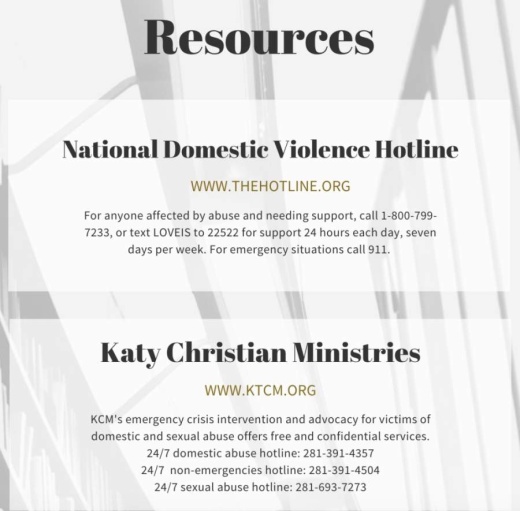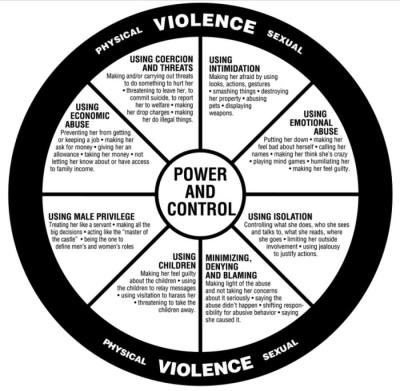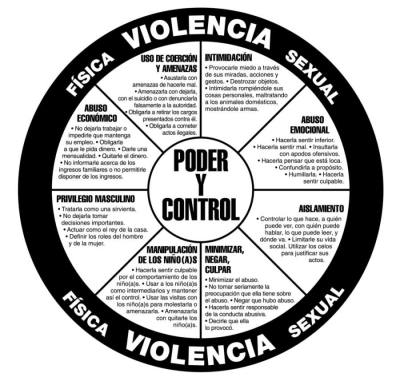Local data suggests the number of domestic violence cases has increased since the shutdown began, and Katy Christian Ministries Director Denise Hastings said she anticipates an increase in domestic violence and sexual abuse calls in upcoming months.
KCM received 50 hotline calls in February and 102 in March, a 104% increase.
“Victims who would normally have access to our center's resources are confined at home with their children and abuser,” Hastings said. “This is indeed a dangerous and frightening time for victims of domestic abuse.”
The Fort Bend County district attorney’s office saw a 25% increase in domestic violence cases from February to March, Executive Assistant District Attorney Wesley Wittig said in an email.
Additionally, led by District Attorney Brian Middleton, the DA’s office saw a 50% increase in domestic violence cases from March 2019 to March 2020, Wittig said.
Social isolation and stress are well-documented risk factors for both domestic violence and child abuse, KCM Crisis Center counselor Lizet Benitez said.
“We need our community to keep their eyes and ears open and report any suspicious activity,” Benitez said. “It is our collective responsibility to keep our community safe.”
Social media and telecommunication
However, it can be difficult to identify emotional and some types of child sexual abuse given their often subtle nature in comparison to physical abuse, and local licensed clinical social worker Julia Cedeño said one way to help is to post resources on platforms such as Facebook or Instagram.
“You might not know that your neighbor or your friend is struggling,” Cedeño said. “People are really turning to social media right now because they are not able to go out to eat with their friends or go out and do things.”
KCM continues to answer hotline calls via a 24/7 Domestic Violence Hotline as well as providing crisis intervention, advocacy and emotional support by telephone, Executive Director Deysi Crespo said.
Hastings said although everyone is facing difficult times in dealing with the pandemic, KCM has confronted the challenge by uniting as a team to implement virtual platforms such as Zoom, DocuSign, telehealth and Microsoft Teams.
“It is important for us to continue to access the needs of our clients who are struggling with social distancing, isolation, and who are experiencing and/or have experienced domestic violence or sexual abuse,” Hastings said.
Benitez said KCM will also offer resources to any family members, friends and neighbors who need assistance in supporting someone affected by abuse.
“We want survivors to know they are not alone,” she said.
School as a safe haven
Children could face a higher risk of abuse and neglect as coronavirus-related school closures keep them away from educators and school staff, who can normally help identify and report signs of abuse.
“School is a safe place for a lot of kids who have homes that are just not loving or nurturing,” Cedeño said. “Now that they are at home, and it is compounded with the stress parents are going through, I just worry. Child abuse is a reality in our city. Kids are being hit, sexually abused and being neglected or going hungry.”
Teachers, administrators, school counselors and other educational professionals report 1 in every 5 child-mistreatment claims in the nation, according to the U.S. Department of Health and Human Services.
Ruthanne Mefford, the CEO of Child Advocates of Fort Bend, told Community Impact Newspaper in March that added family stress and coronavirus-mandated stay-at-home orders may lead to her organization seeing an increase in child abuse cases once children return to school.
Upon resuming classroom instruction, counselors and teachers should be fully equipped with resources to identify children who survived longer periods of abuse and perhaps more extreme levels of abuse during quarantine, Cedeño said.
Cedeño expressed concern about receiving only one call per week to inquire about counseling or play therapy services versus the 10 or more calls she was receiving before the COVID-19 outbreak.
“I think we are really going to see a surge in phone calls when the kids do go back to schools for counseling, for high anxiety,” Cedeño added. “Educators, counselors and teachers are going to need to be on high alert when the kids go back to school.”
In Texas, more than three children die from abuse or neglect on average every week, 182 children are confirmed victims daily, and more than seven children are maltreated every hour, according to TexProtects, a nonprofit organization aiming to protect Texas children from the trauma of abuse and empower families to thrive through education, research and advocacy.
“I think about the kids and families, and I just need them to know that we are all in this together, and me and all the other counselors in the area are here for them,” Cedeño said.







